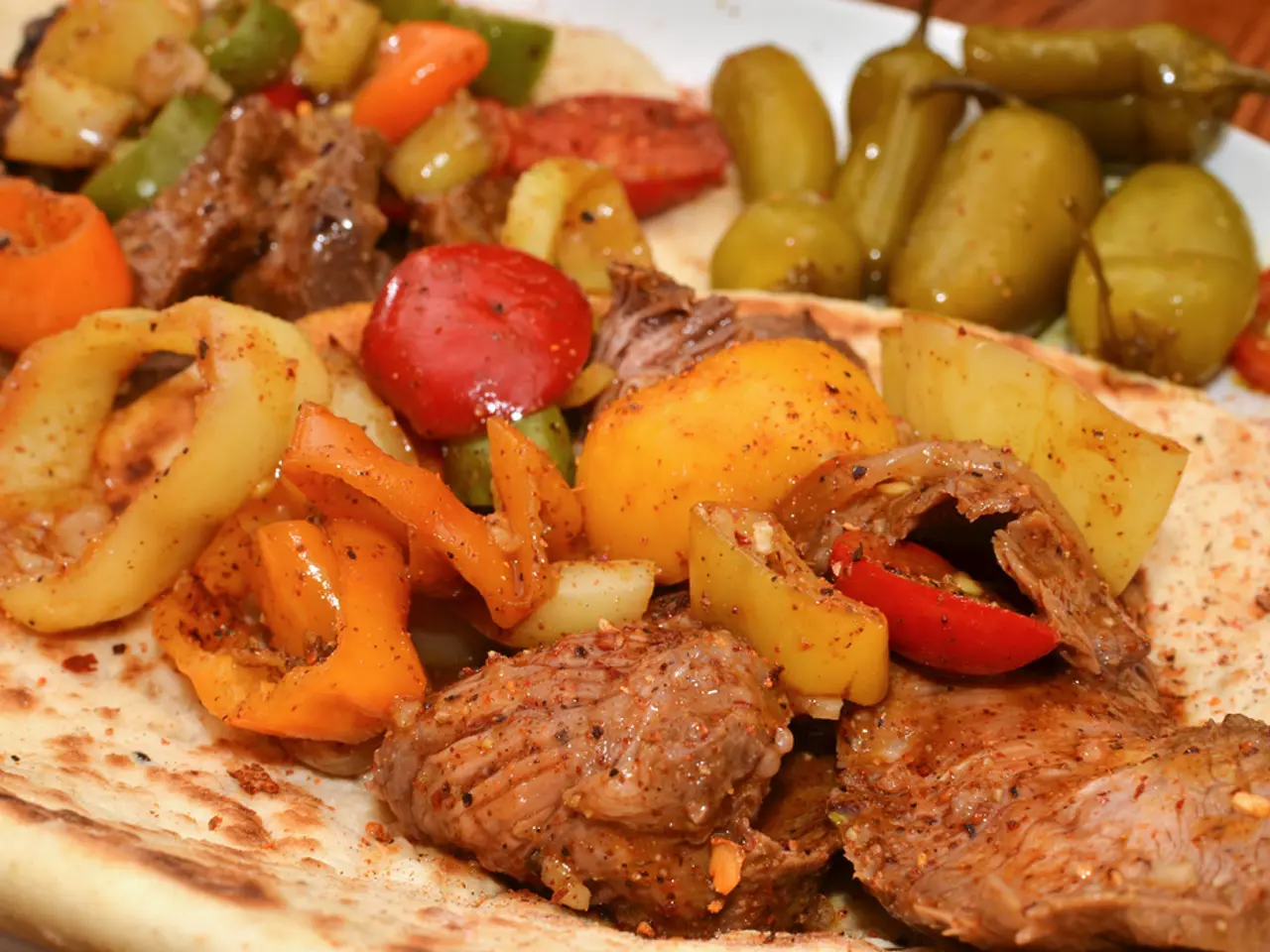Foods potentially reducing stroke risk: Examples detailed and explored
The Mediterranean diet, rich in whole grains, fruits, vegetables, and fish, has been found to significantly reduce a person's risk of stroke, according to numerous studies. This dietary approach, which emphasises nutrient-dense, antioxidant-rich plant foods, healthy fats, lean proteins, and limited unhealthy fats and sugars, contributes to overall better cardiometabolic health.
Key foods in the Mediterranean diet that contribute to stroke prevention include:
- Fruits and vegetables: High in antioxidants and fibre, supporting vascular health. Examples include carrots, cabbage, broccoli, avocado, peppers, tomatoes, and leafy greens.
- Whole grains and legumes: Provide fibre and nutrients that improve lipid profiles and blood sugar control. Examples include oats, bran, quinoa, brown rice, and whole grain bread.
- Nuts and seeds: Sources of healthy fats and micronutrients linked to reduced inflammation. Examples include almonds, walnuts, and sunflower seeds.
- Extra virgin olive oil: The primary fat source, rich in monounsaturated fats and antioxidants, helps lower bad cholesterol.
- Fish and seafood: Provide omega-3 fatty acids known to support cardiovascular health and reduce ischemic stroke risk. Examples include salmon, tuna, and sardines.
- Moderate poultry consumption: Lean protein source with lower saturated fat.
- Limited red meat and sugary foods: Reduces intake of saturated fats and sugar linked to higher stroke risk.
- Healthy beverages: Water, tea (especially green tea in Asian adaptations), and coffee are preferred over sugar-sweetened drinks.
Research, including randomized trials and cohort studies, shows that adherence to this diet lowers ischemic and hemorrhagic stroke incidence by about 20-23%, while also improving blood pressure and cholesterol levels, key stroke risk factors.
However, it's important to note that everyone's health needs are unique. Therefore, it's recommended to consult a healthcare professional before making any significant changes to your diet and lifestyle, especially for people taking medications or those living with health conditions.
In the United States, approximately half a million people have a stroke each year, according to the Centers for Disease Control and Prevention (CDC). By adopting a healthy and balanced diet, such as the Mediterranean diet, individuals can potentially lower their risk of stroke.
In addition to the Mediterranean diet, other tips for stroke prevention include avoiding smoking, keeping a healthy weight, limiting alcohol consumption, regularly exercising, and following the doctor's recommended treatment plan for any underlying health condition.
Foods high in trans fats, which can raise LDL cholesterol levels and reduce HDL cholesterol levels, increasing a person's risk of stroke, should be limited. Examples include fried foods, such as doughnuts, spreads, including margarine, and baked goods, such as cakes, frozen pizza, and cookies.
On the other hand, consuming fruits and vegetables rich in vitamin C, such as citrus fruits and berries, may help reduce a person's risk of stroke, according to a study. Higher dietary protein intake, particularly from sources like eggs, beans, lentils, peas, tofu, and nuts, may also potentially lower the risk of stroke, according to a study from 2017.
In conclusion, adopting a Mediterranean diet, rich in nutrient-dense, antioxidant-rich plant foods, healthy fats, lean proteins, and limited unhealthy fats and sugars, can significantly contribute to stroke prevention. It's essential to remember that a balanced approach to diet, exercise, and lifestyle, in consultation with a healthcare professional, is key to maintaining optimal cardiovascular health.
- The Mediterranean diet, established through numerous studies, significantly reduces a person's risk of stroke, primarily due to its focus on food and food benefits like fruits, vegetables, whole grains, and fish.
- Adherence to this diet, known for its nutrient-dense, antioxidant-rich plant foods and healthy fats, contributes to better cardiometabolic health and weight loss.
- A person's cholesterol levels can be improved by incorporating foods like extra virgin olive oil and fish into their diet, as they help lower bad cholesterol.
- Foods high in trans fats, such as fried foods, margarine, and baked goods, should be limited because they raise LDL cholesterol levels and reduce HDL cholesterol levels, increasing a person's risk of stroke.
- Consuming fruits and vegetables rich in vitamin C, such as citrus fruits and berries, may help lower a person's risk of stroke, according to scientific research.
- Higher dietary protein intake, particularly from sources like eggs, beans, lentils, peas, tofu, and nuts, may also potentially lower the risk of stroke, based on a 2017 study.
- In addition to adopting a healthy and balanced diet like the Mediterranean diet, other tips for stroke prevention include avoiding smoking, maintaining a healthy weight, limiting alcohol consumption, regular fitness and exercise, and following the doctor's recommended treatment plan for any underlying health conditions.




